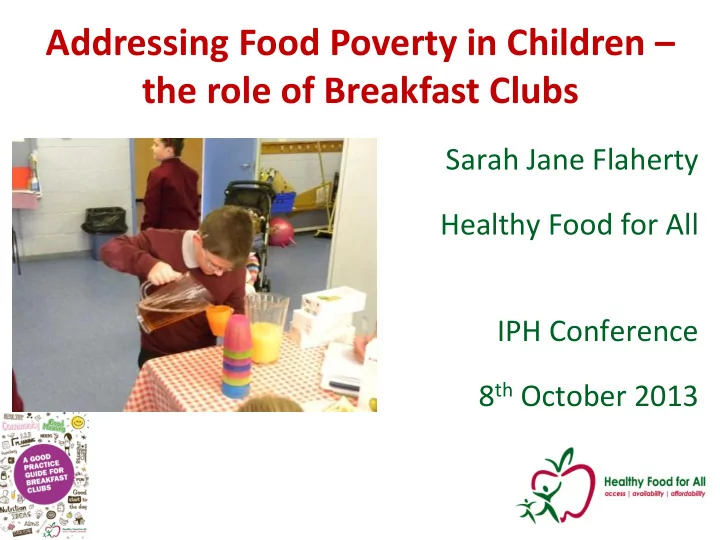

Addressing Food Poverty in Children – the role of Breakfast Clubs Sarah Jane Flaherty Healthy Food for All IPH Conference 8 th October 2013
What is Healthy Food for All? HFfA is an all-island charity seeking to combat food poverty by promoting access, availability and affordability of healthy food for low-income groups
What is Food Poverty? “Inability to have an adequate and nutritious diet due to issues of the affordability of and access to food” (Dowler, 1998)
Food Poverty in Ireland • One in ten people in Ireland are living in food poverty 1 – Increases to one in five (23%) if head of household is unemployed or is a lone parent 1 • One in five children (21%) go to school or bed hungry as there is not enough food in the home 2 • 13% of school children never eat breakfast on a weekday 2 1. Carney C and Maître B, (2012) Constructing a Food Poverty Indicator for Ireland using the Survey on Income and Living Conditions, Technical Paper No. 3, Dept. of Social Protection (2012) 2. Health Behaviour in School-Aged Children Survey (2012)
Why Breakfast Clubs? • Nutritious breakfast has positive impact on nutritional intake • Linked with improved attendance rates and punctuality • Improves cognition, memory, and concentration in class • Develops social eating habits • Opportunity to talk with someone in confidence before school • Opportunity to engage with families on an informal basis
• Planning your Breakfast Club • Funding Your Breakfast Club • Getting Started • Running your Breakfast Club • Developing a Healthy School Food Policy • Breakfast Club Activities • Evaluation • Different models of breakfast clubs • Case studies from across Ireland
Pilot Programme of Breakfast Clubs • Four Primary School in North Dublin – St Catherine’s Infant School, Cabra – St Eithne’s Girls School, Edenmore – Holy Trinity NS, Donaghmede – Holywell ETNS, Swords • January 2013 – June 2014 • Grants of € 5,000 • Funded by Kellogg’s Corporate Citizenship Fund • Direct advice from HFfA based on experience • Training workshop • Networking meeting each term
Evaluation of Pilot Programme What information are we gathering? • What are the benefits of setting up a breakfast club in each school? • What are the challenges of setting up a breakfast club? What supports needed? • What is the cost of setting up a club? • Explore self-evaluation methods Who are we talking to? • Breakfast Club Co-ordinators • Breakfast Club Staff • Teachers • Parents • Children
Learning so far: Benefits “English levels of migrant “Breakfast club has children have improved as it is made a huge difference an extra opportunity to practice. to the school and Teachers have noticed that pupils, it is a great certain children are more initiative.” (Teacher) confident when speaking as a result.” (Breakfast Club Co-ordinator) “Children are more alert and focused in the classroom” “ ‘John’ has been (Teacher) visibly happier since going to the breakfast club.” (Teacher)
Learning so far: Challenges • Time Commitment • Staff for the Club • Engaging Volunteers • Funding • Food Are there differences between DEIS & Non-DEIS schools?
What’s Next? • Work with each school to develop a sustainable action plan • Identify suitable funding streams for schools • Build on local (& national) partnerships to support clubs • Work with each school to engage volunteers • Continue to share the learning through regular meetings • Explore impact of clubs on parents, teachers, and children • Final Report available next Autumn
Contact Details Good Practice Guide is available to download from www.healthyfoodforall.com Hard Copies of the Good Practice Guide can be requested from: Sarah Jane Flaherty sjflaherty@healthyfoodforall.com 00 353 86 7765334
Recommend
More recommend